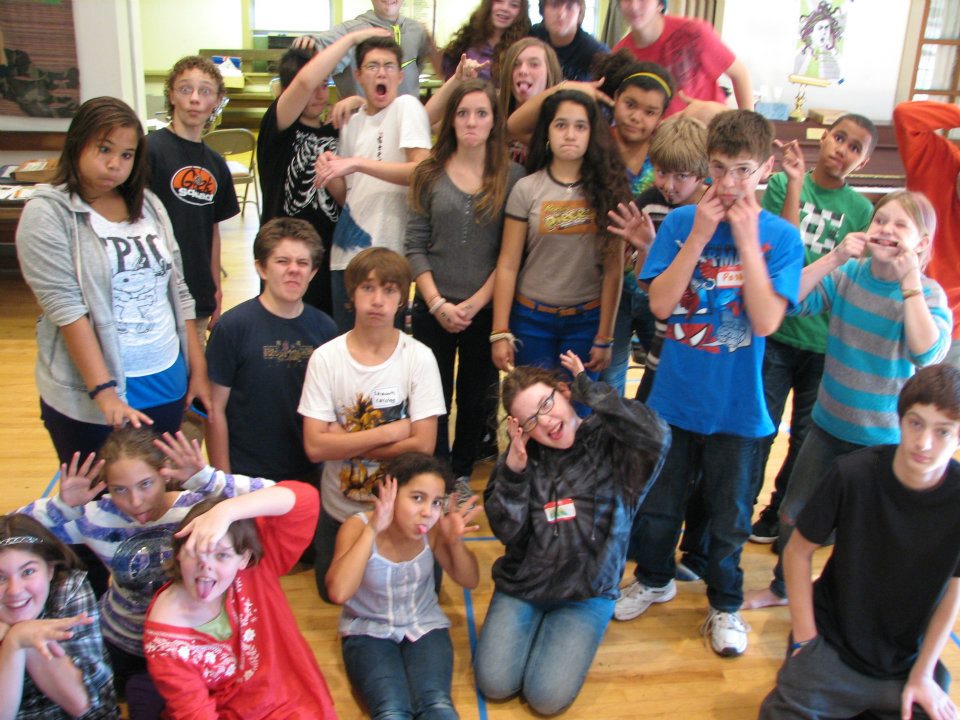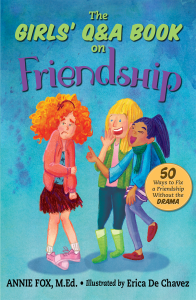|
|
June 25, 2015
We’re up to Part 4 of this (mostly) parenting Q&A series. I’ll occasionally throw in a teen question because, hey, it’s always enlightening to hear kids talk about what we do that drives them nuts. Today’s question concerns the confusion of a parent whose daughter is having an emotionally difficult time (again) with a best friend.
 Best friends forever, right? Today’s Question: Why are girls’ friendships so dramatic? My daughter had a best friend from 2-5th grade. When that girl moved away, my daughter was distraught. Now she’s in 7th, with a new best friend who may be losing interest. My daughter is getting very worried and upset. What can I do to help her put this in perspective?
Since 1997, the #1 issue girls write to me about is betrayal or rejection by a friend. Specifically, “My bff has a new bff! What do I do?” The email writer goes on to describe how she’s crying herself to sleep, has lost her appetite and doesn’t want to go to school or anywhere! Parents are often confounded by the intensity of their daughter’s emotions in these situations. Moms and Dads want to know what they can do to help.
Here’s the way I see it: A girl’s dramatic response to a friendship that’s cooling off resembles how one might react to a romantic break-up. Some girls even refer to losing a friend as getting “dumped.” Girls’ attachment to other girls is a precursor to their search for the The One, aka the Soul Mate, if you believe in that kind of stuff. Even if you don’t, it represents a search for someone who “knows me” and “understands me.” Someone who will laugh at what I laugh at and be equally moved by the things that move me. Someone I feel so close to that I barely need to explain myself to them.
When a girl’s bestie loses interest, and, for whatever reason, wants to spend time with another friend, it’s a major loss. Girls often describe it in classic stages of grief: Denial, Anger, Bargaining, Depression, until they can find their way to Acceptance. That’s where parents can help.
Tips for Helping Your Daughter Process the Loss of a Friend
1. Do not minimize your daughter’s angst. This “drama” she’s feeling and expressing is real. She needs your willingness to listen, without judgment. Dads, I know you want to help, and sometimes you may feel you have no idea where all these emotions are coming from. Moms, you’ve probably had some personal experience with friendship drama (past or present), so help your daughter’s father understand. Bottom line, the goal is not to commiserate with a sobbing girl, but to help her figure out a way through this.
2. Let your daughter talk about how she feels. Just listen with compassion and patience. When you do that, she will calm down because you are giving her an opportunity to express her feelings responsibly and appropriately.
3. Discourage her from getting on social media or her phone. Otherwise the whole thing will blow up like a conflagration, spreading like wild fire. Allies of both girls will feel pressure to take sides and rush onto the digital battlefield. That kind of drama is social garbage and no girl needs more of it in her life.
4. Work toward a reachable goal. After your daughter calms down, ask her “What is the best outcome you can imagine?” Likely she’ll say, “I want her to be my bff again!” Please gently remind her that she doesn’t have the power to control other people’s feelings or behavior, but she can help herself feel better about the situation. For example, instead of feeling sorry for herself, she could talk directly to her friend. This might result in a new awareness for your daughter in these areas:
a) what she needs in a friendship
b) where she draws the line in terms of how she lets people treat her
c) why it’s essential to have high standards for yourself and your friends
d) how important it is to be with someone who wants to be with you as much as you want to be with them
5. Encourage her to shop for a new best friend. Talk with your daughter about the qualities she deems important in a friend. Help her make a list (if she wants your help). Once she knows what she’s looking for she may decide that the “loss” she just experienced wasn’t so much of a loss at all. She may also be energized to go out and find a new best friend –one who provides more of what she needs.
I hope this helps you and your daughter. If you’ve got a question about parenting tweens and teens, email me. If your 8-12 year old daughter could use some help navigating friendships, check out my latest book – The Girls’ Q&A Book on Friendship: 50 Ways to Fix a Friendship Without the Drama.

May 21, 2014
 Let’s figure out this friendship stuff together This is part 2 of the very cool Skype in the Classroom session I had Monday with a class of Philadelphia 8th graders. (Here’s Part 1) I’m all about giving students ongoing, safe places to get real about the challenges of friendships. It’s important to their personal well-being and to a positive school climate.
Student: Annie, what if you have friends who act cool when they’re with you but other times, when they’re with other people, they act really different with you?
What have you tried so far?
Student: I ask them, “Why do you act different with your friends than when you’re with me?” And they said, “I don’t know what you mean!”
All of that “I don’t know what you’re talking about!” is B.S. What you’re describing is The Switcheroo. When it’s just you and your friend, things are cool. Then you add one or two other people and suddenly you’ve switched channels and I don’t even know this person who is supposed to be my best friend. I’m wondering, “Why are you treating me this way?!”
Props to you for asking him what was going on. That was very brave. Most people would feel bad about the way they were being treated in, but they aren’t likely to talk about it. You took the extra step and I have a lot of respect for you.
So you asked your friend about it and he said, “I don’t know what you’re talking about.” That wasn’t true. He knew exactly what you’re talking about. But he didn’t feel proud of the way he’s been treating you, so he wouldn’t admit it.
If that happens again, I suggest you find the EXIT. You may not have ever thought of this, but there is an exit for every friendship. And sometime you just have to give yourself permission to walk through it. You can leave without making a big announcement. You can just say, “I’ll catch you later.” And you leave and spend time on your own doing thing or you hang out with other friends who treat you with more respect, or you take your dog for a walk. Whatever it is, just leave. Because there is no reason to stay with people who are not treating you well. Zero reason. Don’t do that.
Exactly how long do you stay away from this friend or friends? That depends. You could take a short vacation and the next day your friend may ask why you left. Be honest. You can say, “When you’re with other people you don’t treat me very well, so I left.” That gives him something to think about. And maybe the next time he’s with you and other people, he’ll treat you better. Or he won’t.
Sometimes, though, you go through the exit and you never come back to the friendship. And that’s ok too. Sometimes you end a friendship because you’ve outgrown it or because you get a new idea about how you want to be treated. It’s all ok. Just don’t talk about the person after you’ve gone through the exit. That’s not cool. It’s just gossip. Not important.
Before we ran out of time I asked the students what they usually learned in this class with this teacher. And they told me they learned math and science. This wasn’t the answer I expected, so I asked the teacher why he wanted his students to get a Skype lesson on Real Friends vs the Other Kind.
Teacher: We meet once a week, on Monday mornings, and have open discussions where people talk about their lives and share. And friendship is an important topic for us to talk about.
You guys are very lucky to have a teacher who prioritizes this stuff. Someone who says, “This may not be math or science, but it’s important. And I want to give you a platform to talk about it.” That’s awesome. There are not enough teachers like this one. You’re very lucky.

May 19, 2014
Since September I’ve been doing Skype in the Classroom sessions about Real Friends vs the Other Kind with 3rd-10th graders. (Even did one in Croatia!) Today I beamed into an 8th grade class in Philadelphia. Here are some of those students’ questions along with my answers. I’m sharing them to let you know that you are not alone in dealing with any of this stuff.
Student: What would you do if you had a friend you couldn’t trust but you were trying to give them a chance?
 We’re just a bunch of kids trying to figure out this friendship thing It’s good to give someone a second chance. We all make mistakes, right? Sometimes we’re in a bad mood and we’re rude. Sometimes we’re trying to impress other people and we end up hurting a friend. Before you give someone another chance, though, you have to talk about what happened. You can say, “What you did made me feel like I can’t trust you. I want to give you another chance, but first tell me what the heck was going on when you did that?!” A real friend will stop and think. They’ll say something like this: “I’m really sorry. This is why I did it. I promise I’m not going to do that again.” Then you can say, “Cool” and you move forward in the friendship.
But if your friend says, “I don’t know what you’re talking about!” They’re not taking responsibility for what they did. Even though you may want to trust them again, you haven’t really cleared up the problem. They don’t seem to understand what they did and why it wasn’t OK. Chances are good, they will do it again. If you still want to give them another chance, proceed with caution.
Student: If you’re friends with someone and you know that they’re talking about you, what should you do?
You can’t pretend that you don’t know it, so you have to talk about it. But watch your attitude. If I’m angry and I go my friend and say: “Hey, I heard that you’re talking about me. What’s up with that?!” your friend will feel attacked and will defend him or herself. They may say, “I don’t know what you’re talking about” when they actually know exactly what you’re talking about. Or they may be innocent and ask, “Who told you that?! It’s not true!” Maybe the person who told you was lying because they wanted to mess up your friendship. Bottom line here, if you need to talk to a friend about something important, get the facts first and don’t come out fighting. If you know the truth, calm down and say, “I know you’ve been talking about me and it makes me feel like you’re not a real friend.” Then you close your mouth and you listen to what they have to say. Afterwards, decide what’s right for you to do in this friendship.
Student: Have you ever felt like if you didn’t have a friend you weren’t like… normal?
There were times when I didn’t have a real friend. (That’s the only kind worth having.) It’s OK not to have friends if you know that you are friends with yourself. Being cool with who you are lets you be cool with spending time on your own. That’s way better than hanging out with people you don’t trust or respect. Not having a friend can be lonely and sometimes you might wonder, “What’s wrong with me? How come I don’t have at least one person who I’m really close with?” There’s nothing “wrong” with you. It might just be that the people around you are not a good match for you and for the kind of friend you are looking for. It may be that you’ve got high standards for yourself and for the people you call your friends. That’s a good thing.
If you aren’t finding real friends at school, look outside of school. At an afterschool club. Or a youth group. Or at the park. Just talk to people. I used to go to the library a lot when I was in middle and high school. There were kids there from other schools and I got to be friends with some of them.
If you need new friends or more friends… first you need to know what a real friend is. Make a list of what makes a Real Friend. Use it as your “shopping list.” For example, respect is a really important trait in a friend. You may see someone and say to yourself, “Is this person respectful? I don’t know him or her yet, but do I like what I see in the way this person treats others? Would I want a friend who treats me that way?” Think about what you’re looking for and keep your standards high, for yourself and for other people.
I hope this helps, and tune in next time, for Part 2 of Friendship Issues from the 8th grade. Til then, be a good friend to yourself and others.

March 25, 2014
 We can be mean to her and still be nice, can’t we? “Do unto others” makes no sense to middle schoolers. (Ideally it should, but that’s not how TweenWorld currently operates.) To help our kids navigate the turbulent and toxic waters of peer relationships, we’ve got to wake up and smell the reality stinking up their world (online and off).
Of course both girls and boys have middle school friendship woes. And yes, both boys and girls can become Peer Approval Addicts. But girls often take their feelings of hurt, jealousy, betrayal and rejection to dramatic and damaging heights. So let’s talk about girl friendships.
The social garbage girls throw at each other is the stuff of rumors, gossip, harassment, and exclusion. And it often happens under the radar. Because even though a girl may be eviscerating a former bff at school and online, she still wants to think of herself as a nice girl. (I said it was twisted, didn’t I?)
 50 Ways to Fix a Friendship without the DRAMA I wrote The Girls’ Q&A Book on Friendship for 8-12 year olds and the adults who care about them. Let’s face it, parents are rarely aware of what’s going on on the battlefield of their daughters’ friendships. It usually comes to light when their girl feels victimized and can no longer contain her distress. At that moment she may spill the whole story of her so-called friend’s bad behavior. In response a parent might logically advise:
“Tell her how you feel about this. Tell her she’s got to stop.”
“I can’t tell her that!”
“Why not? It’s true!”
“Because it will hurt her feelings!”
“Excuse me!? You won’t tell her she’s hurt you because you don’t want to hurt her feelings?! What about your feelings?”
“Forget about it, Mom/Dad. I’m sorry I said anything. You just don’t get it.”
Bingo! Parents can’t fathom the logic here. But to the girl, the logic is clear. She will swallow her pain because she (justifiably) fears that complaining about bad treatment will cause her friend and all the others in their friendship circle to ditch the plaintiff, swiftly and completely. Our targeted daughter will be friendless and she knows it. And because that is a fate worse than death she puts up with the ongoing abuse. Pretends it doesn’t hurt. Continues to think of these girls as her friends and continues to hang out with them and be abused.
Her confusion over the love-hate/comfort-pain mix may cloud her judgment when she starts dating. If she puts up with emotional abuse in a friendship why assume she’ll choose a thoughtful caring romantic partner over one who dominates, demeans and controls?
As parents we need to help our daughters develop enough self-respect to demand respectful treatment from others, especially those closest to them. Let’s help them acknowledge the truth of what’s going on in their friendships. We won’t be able to change “mean” girl behavior in others, but we can, at the very least, help our daughters acknowledge that their pain at the hands of friends is real, undeserved and unacceptable. Then we can point out their options:
1. Stay silent. Stick with friends who hurt you and expect more of the same.
2. Talk to them about it and let them know you’re no longer giving them permission to disrespect you. If nothing changes, consider option #3.
3. Take a (permanent) vacation from the drama. Reach out to people who share your values about what it means to be a real friend.
Here’s to Real Friends vs. the Other Kind and to less friendship drama!
 — Older Posts »
| |
















